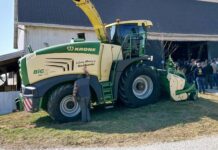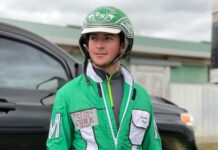
HARRISBURG, Pa. — Everyone thinks differently, and, according to Temple Grandin, putting these diverse minds together is the recipe for success.
Grandin, a best-selling author and professor of animal sciences at Colorado State University, was diagnosed with autism at the age of 3.
This diagnosis shaped her experiences as a pioneer in the field of animal sciences, something that has helped her flourish in a world that often overlooks those who think differently.
Grandin spoke about these experiences during her keynote speech at the 2025 Pennsylvania Farm Show’s Women in Agriculture Day on Jan. 9. She also participated in a fireside chat where she answered questions from the audience.
“A lot of people are mixtures of the different kinds of minds, but we need all of those different kinds of minds because they have complementary skills,” Grandin said.
Growing up
Grandin did not come from an agricultural background. She grew up in Boston, Massachusetts, and was non-verbal until she was 3, the same year she was diagnosed with autism. Instead of sending Grandin off to an institution, her mother remained dedicated to teaching her fundamental social skills.
It wasn’t easy for Grandin growing up in an education system that favored mathematicians over visual thinkers. She was often called stupid, she recalled. However, this way of visual thinking allowed Grandin to excel in other subjects like animal science. Similar to animals, she was able to think with her senses.
“My memory is like little phone pictures and my mind takes pictures of things that interest me. And so, I can understand how the cattle behave,” Grandin said. “One of the first things I did in cattle behavior is I got down in the chutes to see what the cattle were seeing. They stop at shadows. They stop at reflections.”
Grandin was first exposed to agriculture at a boarding school on a small farm in New Hampshire at the age of 14. The following year, she visited her aunt’s ranch in rural Arizona, which ignited her passion for beef cattle.
She later obtained a bachelor’s degree in psychology, a master’s degree in animal sciences and a Ph.D. in animal science. She went on to design humane livestock handling and slaughtering facilities. Her designs are used in roughly half of all cattle processing plants in the United States today.
Through designing these facilities, Grandin realized that all types of thinkers are required to build a successful food processing plant.
“There’s two parts of engineering. There’s what I call the clever engineers. These are the people that design all the mechanical equipment … and then where you need your mathematical engineer is refrigeration systems,” Grandin said. “We never touched that stone. The mathematicians need to work on that. But the thing is, you need both types of thinkers in order to build something like a food processing plant.”
Educational reform
Grandin credits her exposure to agriculture in her teenage years as what led to her successful career in beef cattle. But, according to Grandin, kids nowadays, particularly those with ADHD and autism, need more exposure to agriculture.
“Students aren’t going to get interested in it if they aren’t exposed to it. I can’t emphasize how important exposure is,” Grandin said. “I also want to emphasize again that about 20% of people I work with building big stuff like cardio plants (are) autistic, dyslexic or ADHD.”
Neurodivergent people, those who often see things through a sensory and visual perspective, are needed skill sets, Grandin said. She adds that hands-on classes need to go back into programming at schools.
During the Q&A portion of her speech, Grandin encouraged youth to “get out and experience lots of different things” and try out different careers. In particular, she praised 4-H and FFA programs, which she said were a safe space for her as a kid who was frequently bullied.
The 4-H program allowed her to make friends. “Working with agriculture can be great things for kids who think differently. An autistic person gets friends with shared interests,” Grandin said.
Grandin also discussed the importance of children training show animals, but criticized the way some show animals are raised like ones that are raised in the backyard in conditions that are unlike regular farm animal environments.
Among other topics, she mentioned the importance of raising heritage breeds, grazing to reduce the amount of vegetation that can spark wildfires — noting the ongoing wildfires in Los Angeles — and for solar farms to be adapted for grazing underneath and not covering viable farmland.
To cap off her speech, Grandin was asked: “If you were giving the last lecture of your career, what would (it) be on?” She said she would talk about the need for diverse thinkers and how, just like humans, older animals have wisdom.
“I learned about the science backing it up. Old whales that were passed the reproductive stage were (still) valued because when the sand got scarce, the old ladies knew where to find the sand. They had wisdom,” Grandin said. “I’d like to pass knowledge on to young people because they’re going to be the leaders of tomorrow.”
(Liz Partsch can be reached at epartsch@farmanddairy.com or 330-337-3419.)









